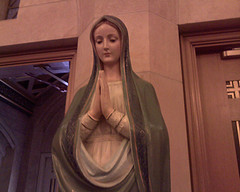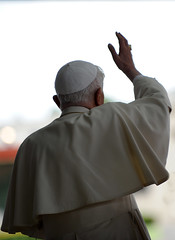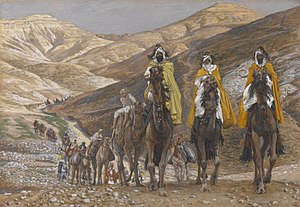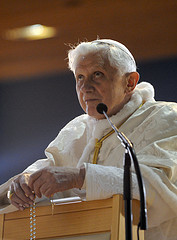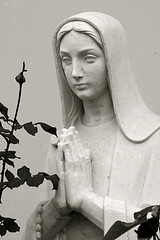I did something stupid — I updated the BIOS on my computer’s motherboard thinking it would solve a problem with my CPU fan. As a result, my computer blue screened at Windows start up. So I was without a functional computer for over a week resulting in lost productivity and a lot of frustration. For those who aren’t computer geeks like me, I tried updating my computer and ended up breaking it. This small ordeal taught me a lot about the details of my computer and how changing one little component can have far reaching consequences. It also taught me a lot about faith and dogma. Sometimes in life, when we ignore little warnings and the wisdom of others, we can find ourselves in a whole heap of trouble.
 I could not find any updates or fixes for my noisy fan problem on my computer manufacturer’s website. However, I did find a similar update file elsewhere and installed it despite all the warnings on the manufacturer’s website saying I should only use the updates they provide. I thought I knew better. I thought the update file I found would work just fine and all the warnings were for people with much less computer experience. But as I quickly discovered when I turned my computer into an expensive paper weight, there’s a reason why the manufacturer’s website had those warnings. I would have saved myself a lot of grief by heeding the manufacturer’s advice.
I could not find any updates or fixes for my noisy fan problem on my computer manufacturer’s website. However, I did find a similar update file elsewhere and installed it despite all the warnings on the manufacturer’s website saying I should only use the updates they provide. I thought I knew better. I thought the update file I found would work just fine and all the warnings were for people with much less computer experience. But as I quickly discovered when I turned my computer into an expensive paper weight, there’s a reason why the manufacturer’s website had those warnings. I would have saved myself a lot of grief by heeding the manufacturer’s advice.
What does my experience breaking my computer have to do with the Catholic faith? It taught me a great lesson in the importance for dogma. The rules, guidelines, and teachings of the Catholic Church exist for a reason. They act like a user’s manual and warranty for one’s spiritual, mental, and physical well being. And when someone decides to ignore those rules and warnings, like we do when we sin, unpleasant difficulties can emerge.
Think about some of today’s hot button theological topics that popular culture criticizes the Catholic Church over like premarital sex, artificial contraception, divorce, abortion, embryonic stem cells, homosexuality, natural law, existence of absolute evil, and the objectivity of sinful behavior. They often criticize the Church without really looking at the Church’s history and why it teaches what it teaches. It isn’t that the Church wants to control everyone’s lives or destroy our fun. Quite the opposite, the Church’s teachings are meant to protect us from harm and give us the best possible opportunity for happiness.
Let’s look at premarital sex as an example. If you were to read any anti-Catholic (or just a secular) publication, you would think that the Church is just “old fashioned” and has a fear of women’s sexual freedom because it is run by a bunch of old, celibate men. But if you actually look at the Church’s teachings, you will find that one of the reasons for coming out against premarital sex is to strengthen the bonds of marriage and allow a couple to experience a deeper sense of love for each other. When people wait, they increase their chances of living a happier life. The Church’s stance is even supported by a lot of secular research that shows that the divorce rate is lower for those who are virgins when they marry. When you look around society and see the STDs, higher divorce rate, and just general unhappiness that has come from “free sex” you come to see the logic and wisdom on why the Church teaches you to wait for marriage. It’s not always easy to do what is best for us. Like impatient children that “just want it now” because “we feel like it,” many people dismiss the Church’s teachings only to find hardship, anger, and sadness.
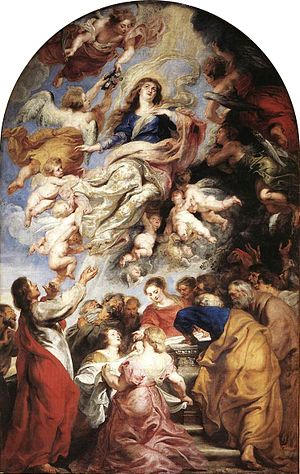 When I think about the rules and dogma of the Catholic Church, I think of the Fourth Glorious Mystery of the rosary — The Assumption of Mary. I have said multiple times that Mary is our guide in finding ultimate happiness in God’s heavenly kingdom. She is joined by saints, theologians, and others who have contributed over the last 2,000 years to the collective knowledge of the Catholic Church. We owe it to ourselves to listen to Mary and these other guides through prayer and read the Church’s “users’ manuals” such as the Bible, the Catechism, encyclicals, and other teachings. We owe it to ourselves to build up knowledge of our faith so we can make decisions that will lead us closer to God’s grace and not stray when society tempts us to live contrary to the faith.
When I think about the rules and dogma of the Catholic Church, I think of the Fourth Glorious Mystery of the rosary — The Assumption of Mary. I have said multiple times that Mary is our guide in finding ultimate happiness in God’s heavenly kingdom. She is joined by saints, theologians, and others who have contributed over the last 2,000 years to the collective knowledge of the Catholic Church. We owe it to ourselves to listen to Mary and these other guides through prayer and read the Church’s “users’ manuals” such as the Bible, the Catechism, encyclicals, and other teachings. We owe it to ourselves to build up knowledge of our faith so we can make decisions that will lead us closer to God’s grace and not stray when society tempts us to live contrary to the faith.
I lost a week to a broken computer because I didn’t heed the warnings. When you don’t heed the Church’s wisdom, you could lose much, much more — happiness, your life, your freedom, God’s grace, and His heavenly kingdom.
Related articles
 Warnings in the Wind(trusthismercy.wordpress.com)
Warnings in the Wind(trusthismercy.wordpress.com)
 At Week’s End for May 25, 2012(realstorypublishing.com)
At Week’s End for May 25, 2012(realstorypublishing.com)
 Nancy Popelosi Knows All About Catholic Doctrine(independentsentinel.com)
Nancy Popelosi Knows All About Catholic Doctrine(independentsentinel.com)



